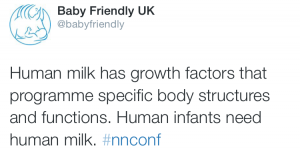
Any family that has spent time in a NICU unit, myself included, will know how much the care they receive matters. Not only does it matter for baby but it matters for mom and the family. The journey of NICU is scary, bewildering, lonely and frustrating. Families need support to navigate the challenges but support that encompasses compassion, kindness and patient centred care. We expect care for the physical, medical side of the journey to be the best but what about the emotional side of both baby but also the parents?
Yesterday was the UNICEF baby-friendly conference for neonatal care, setting out the new standards for care that will help support families to build loving relationships with their premature babies and also provide support to families so then can give life saving breastmilk to these tiny, sometimes very sick, vulnerable babies. ‘The UK Baby Friendly Initiative is based on a global accreditation programme of UNICEF and the World Health Organization. It is designed to support breastfeeding and parent infant relationships by working with public services to improve standards of care’.
Why is the BFI so important for NICU units?

It’s important that all families no matter where they live receive up to date, evidenced based care, that is consistent. The ‘global’ baby friendly initiative enables care to be given that is optimal for both baby and family both in the short term but in the long term.

The standards are based on what is considered to be the rights of a child and family. The UNICEF UK Baby Friendly Initiative provides a framework for the implementation of best practice by NHS trusts, to support families in feeding their baby. For premature babies this is especially important. Baby friendly standards are the minimum standard that NICE guidelines recommend for maternity units. So how much more important is it that all NICU units be working towards being fully accredited and giving the best possible care for their babies and families.
So what does the BFI highlight as being vital for babies NICU?
So families must be partners when it comes to caring for their babies. Too often parents can feel like bystanders, looking at their babies through a glass wall unsure if they can touch, hold or care for them. Many feel they do not become parents until they leave the unit, finding most of the care of their baby done by staff.
So what should units be doing to support families?
Units need to help parents build loving, nurturing, relationships with their baby. How? Staff can support parents to cuddle, hold, do skin to skin and feed their baby.
But this can be a seen as a challenge if babies are in an incubator. Should this prevent parents being able to care for their baby?
Do units need to re-think the way they view skin to skin between mother and baby? Are they encouraging parents to hold their babies as much as they can to help stabilise temperature, breathing, heart rates, and sugar levels? Are they perhaps relying too much on the wonderful technology we have but forgetting the abilities of the amazing human body to also care for its newborn?
Why is skin to skin so important for mother and baby?
 Resilient, isn’t this exactly what we need a premature baby to be? Able to survive, able to grow, develop, maintain breathing, temperature, heart rate and blood glucose levels? Arriving early and often needing medical intervention is so stressful to the tiny baby. Skin to skin reduces cortisol and increases oxytocin thus calming baby. Skin to skin with its mother a premature baby will also sleep better allowing for better brain and growth development.
Resilient, isn’t this exactly what we need a premature baby to be? Able to survive, able to grow, develop, maintain breathing, temperature, heart rate and blood glucose levels? Arriving early and often needing medical intervention is so stressful to the tiny baby. Skin to skin reduces cortisol and increases oxytocin thus calming baby. Skin to skin with its mother a premature baby will also sleep better allowing for better brain and growth development.


- Are units encouraging moms to be there at the unit as much as they can, to hold their babies, skin to skin and help build these loving nurturing relationships?
- What Impression do units give parents?
- Do parents feel ‘in the way’?
- Are parents trained and supported to care for their babies and feel part of unit?
- Are parents allowed to be part of the ward rounds and given time to ask and discuss the care of their baby?
- What about the culture of the unit? Is it a place of hope?
- Do parents have support with meals, a place to sit and access to peer support?
- Why is this important?

The relationship between a mother and her premature baby is vital for development, are we supporting families to do this?
SUPPORT FOR FEEDING
What about breastmilk for premature babies? How important is it to support mothers to express for/breastfeed their premature babies?
Can there really be any doubt about the importance of breastmilk? Often for many mothers it is the very thing that keeps them going, that enables them to do ‘something’ for their baby. It is life saving reducing the likelihood of deadly illness such as NEC. It helps the growth of a premature baby’s brain, in fact more, it protects it. Breastmilk protects the gut of a premature baby and provides vital antibodies to fight infection. Yes supporting families to provide breastmilk for their premature baby is vital.
It is beneficial to the unit too as it reduces infection, time spent in the unit, the cost of using donor milk and reduces readmissions. It isn’t an easy journey but it can be done!


So, is it important the care provided in NICU? Of course!

For units to be UNICEF baby friendly accredited should be the norm. It provides frameworks to build policies, services and care on. It trains and protects staff giving them evidence based research on which to base the care provided in units. It protects parents too enabling them to do the best for their baby, be involved in their babies care and have emotional support to build lasting loving relationships.
Does this mean it is easy for NICU’s to implement BFI standards ? Maybe not, but small changes can be a start and any change will benefit families.
What can units do to move towards being BFI accredited to provide care that supports babies and families in NICU’s everywhere?
It must be a team effort. NICU’s, maternity services and all the staff must work together to make it a success. It will require hard work, belief in each other and reviewing and updating models of care. It will mean training and drawing up of new policies and implementing changes to the way they work. This will mean adjustments for staff and maybe challenging the way they think personally. To do this they will need support from each other, from managers and directors and the hospital as a whole.

But it will be so worth it!
Patients rely on us to care for them when they are most vulnerable. A baby that is born early maybe the most vulnerable of all. For baby and family NICU is a difficult journey full of fears, anxiety and uncertainty. We must always make sure the care they receive to get through that journey is the best that we can give. We need to give care that gives the best chance for that baby to survive and do well not only in hospital but for life.
It’s not just medically, but also about making sure that parents build loving relationships at a time when it matters most. The care families receive in NICU can stay with them a lifetime. The BFI is there to support everyone, all we have to do is embrace it and let it lead the way in providing families with care that gives way more to families than it asks for us to implement it.















I love this- what a fabulous resource for parents and professionals. I love that you write with such passion, you truly are wonderful! I agree that all families need love and support when a new baby arrives, and more so when they are faced with the alien world of NICU. Thank you so much for sharing with #MaternityMatters x x
I love this- what a fabulous resource for parents and professionals. I love that you write with such passion, you truly are wonderful! I agree that all families need love and support when a new baby arrives, and more so when they are faced with the alien world of NICU. Thank you so much for sharing with #MaternityMatters x x
I love this- what a fabulous resource for parents and professionals. I love that you write with such passion, you truly are wonderful! I agree that all families need love and support when a new baby arrives, and more so when they are faced with the alien world of NICU. Thank you so much for sharing with #MaternityMatters x x